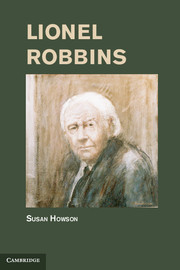Book contents
- Frontmatter
- Contents
- Illustrations
- Abbreviations
- Introduction
- One Father and Son
- Two The Great War
- Three Postwar
- Four The London School of Economics
- Five Iris Gardiner
- Six New College Oxford
- Seven The Young Professor
- Eight Fritz and Lionel
- Nine The School in the Mid-1930s
- Ten The Approach of War
- Eleven The Economics of War
- Twelve Director of the Economic Section
- Thirteen Anglo-American Conversations
- Fourteen The Law Mission and the Steering Committee
- Fifteen 1 9 4 4
- Sixteen The Last Months of the War
- Seventeen The Postwar Settlement
- Eighteen Return to the School
- Nineteen The End of the Transition
- Twenty LSE in the Early 1950s
- Twenty-One Chairman of the National Gallery
- Twenty-two Lord Robbins
- Twenty-three The Robbins Report
- Twenty-four The Sixties
- Twenty-five The Arts
- Twenty-six The Troubles at LSE
- Twenty-seven Retirement
- Conclusion
- Bibliography
- Index
Ten - The Approach of War
Published online by Cambridge University Press: 07 October 2011
- Frontmatter
- Contents
- Illustrations
- Abbreviations
- Introduction
- One Father and Son
- Two The Great War
- Three Postwar
- Four The London School of Economics
- Five Iris Gardiner
- Six New College Oxford
- Seven The Young Professor
- Eight Fritz and Lionel
- Nine The School in the Mid-1930s
- Ten The Approach of War
- Eleven The Economics of War
- Twelve Director of the Economic Section
- Thirteen Anglo-American Conversations
- Fourteen The Law Mission and the Steering Committee
- Fifteen 1 9 4 4
- Sixteen The Last Months of the War
- Seventeen The Postwar Settlement
- Eighteen Return to the School
- Nineteen The End of the Transition
- Twenty LSE in the Early 1950s
- Twenty-One Chairman of the National Gallery
- Twenty-two Lord Robbins
- Twenty-three The Robbins Report
- Twenty-four The Sixties
- Twenty-five The Arts
- Twenty-six The Troubles at LSE
- Twenty-seven Retirement
- Conclusion
- Bibliography
- Index
Summary
The rise of Hitler in Germany eventually led the National Government to announce in March 1935 a policy of rearmament which went slowly into effect in 1936. In June 1935 Stanley Baldwin replaced MacDonald as Prime Minister; in November he called a general election which returned his government and gave it a mandate for rearmament. Meanwhile Mussolini had decided to attack Abyssinia: economic sanctions imposed by the League of Nations failed to stop him and were withdrawn in June 1936. Three months earlier Hitler had sent German troops into the Rhineland; neither France nor Britain was prepared to act, the latter only offering France and Belgium a guarantee against future aggression. And in the summer of 1936 there came the Spanish civil war when the Spanish generals led by Francisco Franco rebelled against the elected republican government.
Lionel accepted public opinion would not permit British action over the Rhineland. Although, as he told his sister on 9 April, he was ‘not averse to fighting them…there would be a moral disadvantage in fighting on an issue about which 50% of the population at home took the German view. But I would arm & refuse to negotiate.’ As he told his father two days earlier, there was no point in negotiating with a ‘blackguard’ whereas rearmament might mean that ‘if we call his bluff now we can avoid bloodshed which otherwise is inevitable if not in my time at any rate in Richard’s’. With respect to Spain he thought his father would feel as he did in August that ‘the government here [in Britain] has done well to keep us out of it. “A plague on both their houses” say I.…I can see no outcome which can be regarded as good.’ He was beginning to despair of the League of Nations: ‘I am as much a believer in the necessity of a super-national authority as ever. But I don't want to be dragged into these totally unsympathetic quarrels of the right & left in faction ridden Europe & I don't want a League which is a disguise for a Triple Entente & now that the attempt to save Abyssinia has broken down completely, I feel more & more that a greater detachment from Europe is the best we can hope for at the moment. Of course the situation might change any moment so as to offer more hope. But I am not optimistic.’
- Type
- Chapter
- Information
- Lionel Robbins , pp. 294 - 341Publisher: Cambridge University PressPrint publication year: 2011

